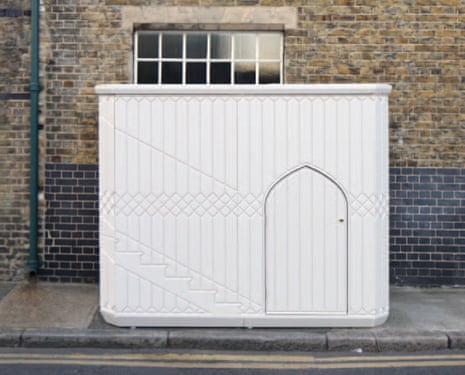In its early days, the band I’m in played a few very poorly attended gigs. There were one or two memorable nights when I insisted afterward that there were more people on stage than in the audience, but I don’t think that was ever literally true. It just sounded funny.
I can’t imagine putting myself through such a thing voluntarily, until I find myself standing in the lobby of a building in Shoreditch, east London, on a cold Wednesday morning with a banjo round my neck, inspecting a little grey shed.
Folk In A Box is the invention of Emily Barker and Dom Coyote, musicians who describe it as the world’s smallest music venue. It’s so small that the band has been pared down to only two of us: James the guitarist, and me. Even so, we will still outnumber our audience: you play one song, to one person, in the dark.
Emily shows us the inside of the box, which is parked outside the Americana Music Association UK’s annual conference.
“You stand up this end,” she says. “And the audiant comes through the little door.” My head is grazing the ceiling. There is, Emily says, a 15-minute break between conference events, during which people come out and queue beside the box. The first three or four get a song each, before everybody files back into the auditorium for the next speaker.
Once we’re alone in the box, we realise that our repertoire will be limited to songs we can play without being able to see our fingers.
“Let’s just play the same thing over and over,” James says.
“Yeah,” I say. “They won’t know.” There is a knock at the door. A woman comes in and sits down. We play her our song. By the time we finish, my eyes have adjusted to the dark and I can see that she is beaming.
“That was amazing!” she says, standing up. “Thank you!”
“You’re welcome,” I say. “Don’t forget about the Hail Marys.” She doesn’t say anything. The door opens, and she leaves. James and I sit in silence for a moment.
“Sort of intense, isn’t it?” I say.
“Yeah,” James says. There is another knock at the door.
“This time I’m going to make the Hail Mary thing work,” I say.
I arrive home about an hour later, to find my wife sitting at her computer.
“How was your little thing?” she says.
“Small,” I say. “Like a confessional, although not many people seem to understand what…”
“We’ve been invited to a party in June,” she says. “Are you free?”
“I’ll have to check,” I say.
“Would you,” she says.
“What am I talking about?” I say. “I don’t have to check. I’m totally free!”
This is because the band has decided not to schedule any dates after a final one next month, our last for at least a year. The break, while it hasn’t arrived yet, is beginning to make itself felt in the lack of required forward planning. I’m suddenly, frighteningly available.
Along with all the gigs – between 30 and 40 a year – there have been standing Wednesday rehearsals, extra emergency rehearsals, blocks of time in recording studios, long weekend drives to play in far-off radio stations and the occasional embarrassing admission that I can’t go to someone’s wedding because I’ve got a photo shoot booked that day. In one of my old diaries I found a day where I’d written “anniversary” alongside the word “rehearsal”. I don’t remember how that particular clash resolved itself, but I’m certain I didn’t cancel one or the other. Over the years I’ve obliged my wife to prioritise this constrictive timetable, without the excuse of being in Razorlight.
It was almost exactly 10 years ago that I went to see a friend’s new band play in the upstairs room of a pub. I remember thinking how supportive that made me seem. Two months later, I found myself on stage with them, holding an instrument I could barely play. There have been nearly 300 gigs since then, some small, some big. I reckon I needed every single one of them to work up the courage to play in front of just one person.

Comments (…)
Sign in or create your Guardian account to join the discussion